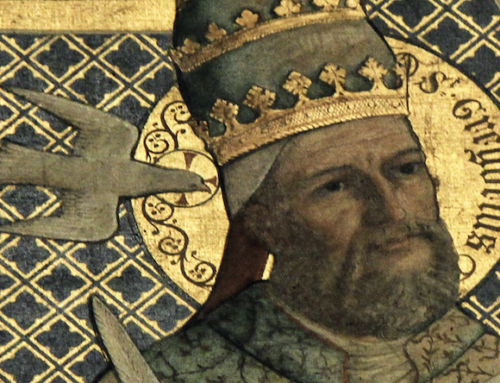Pause for a minute and consider God.
Where does your mind take you?
I think for most of us the mind goes outward. We imagine God somewhere way out there beyond the stars and outer limits of the cosmos. From his seat faraway, he admires all he has made, and if we’re lucky, he might even look upon one of us with his favor.
This perspective is problematic.
First, God does not have a body; he is therefore not “in a place” or “far away.” “Where” is he then? Everywhere. Saint Paul teaches, “He is actually not far from each one of us, for ‘In him we live and move and have our being’” (Acts 17:27b-28a). I am because God is. Those things that are deepest in me—my life, my ability to will this or that, my very existence—are caused at all times and in all places by God’s innermost presence (cf. Thomas Aquinas, ST I, q. 8, a. 1). The hand holding a cup of coffee four feet from the ground is like God holding me in being. His “right hand holds me fast” (Ps 63:9 Grail), and he does not let go. “Where shall I go from your Spirit? Or where shall I flee from your presence? If I ascend to heaven, you are there! If I make my bed in Sheol, you are there!” (Ps 139:7-8). Wherever I am, there God is. Reason alone can even lead us to this awesome conclusion.
Beyond reason’s ambit, however, there lies a yet more profound truth about God’s nearness to the human soul. The Son reveals this truth: “If anyone loves me, he will keep my word, and my Father will love him, and we will come to him and make our home with him” (John 14:23). The Son reveals that God is a communion of Persons—Father, Son, and Holy Spirit—who dwell together in perfect unity (cf. John 10:30). The Son reveals that God has invited us to share in this communion. The Son reveals that our sharing in this communion is made possible by God dwelling in our souls. When the soul is in a state of grace, God is inwardly present not only as sustainer and mover, but as light and fire making us capable of divine knowledge and love (Thomas Aquinas, ST I, q. 43., a. 3). The Father sends his Son, “the light of men” (John 1:4), to illuminate our minds with the truth of God. The Father and the Son send the Holy Spirit to enflame our hearts with the love of God (Rom 5:5; cf. John 14:16). And where the Son and the Spirit are, there too is the Father. The body becomes a temple for the Triune God (1 Cor 6:19).
It is not altogether wrong for the mind to go outward in contemplating God. God is wholly other. An infinite gap separates the Creator and the creature. My existence (the entire world’s existence!) is not necessary. God, on the other hand, is his own existence and he necessarily is: “I am who I am” (Ex 3:14). But precisely because of God’s supreme transcendence, he is most inwardly in all that is. The Christian at prayer contemplates a truth yet more marvelous. Gazing inwardly not to consider himself but to consider God, he might pray,
O my God, Trinity whom I adore, help me to forget myself entirely that I may be established in you as still and as peaceful as if my soul were already in eternity.
May nothing trouble my peace or make me leave You, O my Unchanging One, but may each minute carry me further into the depths of Your Mystery.
Give peace to my soul; make it Your Heaven, Your beloved dwelling and Your resting place. May I never leave You there alone but be wholly present, my faith wholly vigilant, wholly adoring, and wholly surrendered to Your creative Action (Saint Elizabeth of the Trinity, Prayer to the Holy Trinity).
✠
Image: Anna Ancher, Evening Prayer (Wikimedia Commons)







